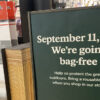In 1966, God was pronounced dead. More recently, it was determined that God is back. But now a team of researchers has put him on the endangered species list.
“Religion may become extinct in nine nations,” says a BBC headline today reporting on a presentation made at the American Physical Society meeting. Based on census data showing increased religious non-affiliation, the study “indicates that religion will all but die out altogether in those countries.”
“The idea is pretty simple,” says one of the researchers. “It posits that social groups that have more members are going to be more attractive to join, and it posits that social groups have a social status or utility.”
If these researchers are right that religion is on its way to extinction in Australia, Austria, Canada, the Czech Republic, Finland, Ireland, the Netherlands, New Zealand, and Switzerland, the more interesting question to pose is: Why these countries, and why in the 21st century?
Religion has not only continued through the course of human history but thrived in a variety of cultural contexts. Clearly, the social group competition idea could not explain early Christian history and other episodes over the centuries where religious minorities—even persecuted minorities—have continued to attract adherents and grow dramatically. And in modern societies, Islam is rapidly growing across the globe, and worldwide Pentecostal membership is surging.
The assumption that political and social progress will increasingly marginalize religion has dominated many academic circles. However, data on religious belief and practice in the U.S. and around the world defy that theory. Recent commentary and books have contested the notion. The latest—launched at an event earlier today at Georgetown University’s Berkley Center—is God’s Century: Resurgent Religion and Global Politics. Authors Tim Shah, Monica Duffy Toft, and Dan Philpott analyze how and why religion’s worldwide influence is increasing.
Even with an increase in religious non-affiliation, religious belief and practice continue to be strong in America as well. More than 60 percent of Americans have no doubt that God exists, and almost 40 percent frequently practice their faith. The majority of Americans still hold to some religious belief.
The American experience also demonstrates the diverse nature of religion in religious affiliation as well as in individual religious practice. Even among the religiously unaffiliated, which might seem like a homogenous group, there is debate about whether the rise in those claiming “none” on surveys of religious affiliation are actually not religious—or whether changes in religion have left researchers asking outdated questions that no longer fit many people’s actual experience. While affiliation with organized religion may have declined, and among young adults in particular, individuals are not necessarily becoming less “religious” or “spiritual.”
According to the Pew 2007 Religious Landscape Survey, about one-quarter of the “non-affiliated” group (16.1 percent of the overall population) are either atheists or agnostics (about 1.6 and 2.4 percent of the adult population, respectively). Among the remaining three-quarters of the “non-affiliated,” who describe their religion as “nothing in particular,” about one-half are “secular unaffiliated”—i.e., those who say religion is not important in their lives (about 6.3 percent of the adult population)—and the other half are the “religious unaffiliated”—i.e., those who say religion is either somewhat important or very important in their lives (5.8 percent of the adult population).
Suffice it to say that there’s more to religion and its future than current surveys of religious affiliation can capture. The endurance of the transcendent will continue to be the subject of projections using finite models. But rather than continually revising those estimates, here’s an alternative hypothesis: As long as human nature persists, man will be wrestling with God. In other words, religion is a permanent feature of the human race.
Co-authored by Christine Kim.

























